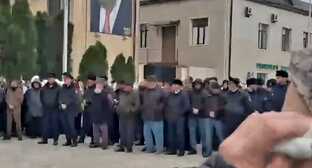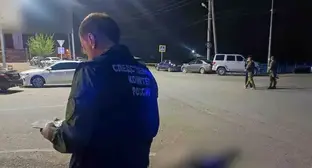16 December 2013, 09:00
Week in the Caucasus: review of main events of December 9-15
Bad weather creates problems for regions of Southern and Northern Caucasus and Southern Russia; start of considering the bill on abolishment of direct election of KBR leader; adoption of "Self-Government Code" in the first reading by Georgian Parliament against the opposition's boycott; detention of the former head of the OJSC "IDGC of Northern Caucasus" in the case of embezzlement of 4 billion roubles; change of plaque in Zmiyovskaya Balka Memorial in the Rostov Region, – see the review of these and other events in the Caucasus during the week of December 9-15, 2013, prepared by the "Caucasian Knot".
Bad weather hits Caucasus and Southern Russia complicating residents' life
The last week was notable – in Southern and Northern Caucasus and Southern Russia – by a series of emergencies associated with an abrupt change in weather conditions. Most reports about accidents came from the Volgograd Region and Georgia.
On December 11, in Volgograd, because of heavy snowfall, they cancelled primary school classes; and city and region residents reported a traffic collapse: on several major highways dozens of people were blocked in traffic jams. Due to the adverse weather conditions, in the evening, the region was put under the state of emergency. Fortunately, there were no casualties and victims. The Prosecutor's Office of the Region said that the administration of the regional capital failed with efficient measures for road safety organization. After the emergency, several officials of the city Mayoralty were fired.
An abundant snowfall that hit Georgia on December 8 provoked snow drifts and icy condition on country's highways. On December 9, the village of Salibauri of the Khelvachauri District of Adzharia had collapse of greenhouse roofs under the weight of snow; two women were killed and ten people were injured. On the following day it was reported that more than 160,000 consumers had electricity outages due to the snowfall; by December 12 dozens of villages in the West of Georgia remained isolated; and the country suspended 85 schools in total.
Bad weather brought problems to other regions. On December 14, in Nagorno-Karabakh, some bus routes from remote areas to Stepanakert were cancelled because of icing. In Rostov-on-Don, on December 10, a heavy snowfall and wind fell down eight trees – in three cases tree trunks damaged passenger cars. On that very day, in Sochi, a squall knocked down 205 trees; and due to a snowfall the Mamaisky Pass was blocked, forming a kilometre long traffic jam; the Sochi Airport worked on the actual weather. On December 10, the Tuapse District of the Krasnodar Territory cancelled school classes; the highway Maikop-Tuapse was blocked, in the vicinity of the farm of Grechesky, by a landslide, which partially blocked about five meters of the road. In Krasnodar, on December 10, icing caused over 200 road accidents; and several streets were partially flooded in the Prikubansky city district.
Accidents that caused electricity outages and failures in water or heating supplies also occurred in Krasnodar, Adygea, Ingushetia and Chechnya.
KBR Parliament starts considering abolishment of direct elections of republic's leader
On December 13, in the Kabardino-Balkarian Republic (KBR), where last week Arsen Kanokov resigned from the post of the republic's top manager, and Yuri Kokov was appointed as the acting head, the MPs began considering a package of bills to abolish the direct elections of the head of the republic by the population. The documents will be sent to all the stakeholders for their comments, conclusions and amendments; then, they will be brought for consideration by the Parliament.
Georgia adopts in the first reading "Self-Government Code" providing local government reform
At its plenary session on December 13, the Georgian Parliament unanimously adopted in the first reading the "Self-Government Code", providing a new administrative-territorial division of the country, stipulating the election of city mayors and heads of district administrations by direct vote, as well as defining the cities, which will be awarded the status of "self-governing cities", and assuming to set up councils under regional governors, which will include representatives of local authorities. The bill was supported by 82 MPs of the ruling coalition "Georgian Dream", while the oppositional "United National Movement" failed to participate in the work of the Parliament. Oppositional and non-governmental activists of Georgia criticized the bill – they were outraged that no public hearings were held during its preparation.
Ex-director of OJSC "IDGC of Northern Caucasus" detained under the case of embezzlement of 4 billion roubles
On December 12, the Russian Ministry of Internal Affairs (MIA) reported the detention of Magomed Kaitov, a native of Karachay-Cherkessia and the former director of the Open Joint-Stock Company (OJSC) "IDGC (Interregional Distribution Grid Company) of Northern Caucasus", currently residing in Moscow. The detention is linked with the case of the transfer in 2007-2011 of the fees for electricity collected from consumers to Moscow commercial organizations, which later spent them on the purchase of real estate, securities and shares. Investigators have revealed the total damage in the amount of 4 billion roubles. Kaitov has already been arrested by the court. Criminal cases initiated against the "IDGC of Northern Caucasus" are investigated in several regions, while Kaitov himself denies all the charges.
Rostov Region: Zmiyovskaya Balka Memorial now bears mention about murdered Jews
On December 9, the authorities of the Rostov Region decided to place a new plaque at the memorial complex in Zmiyovskaya Balka, on which the phrase "…of Soviet citizens" was replaced by the words "…of Jews", leaving the upper part of the text unchanged. Leonid Leybin, a member of the Rostov Jewish community, which had tried unsuccessfully through the court to return the original earlier inscription mentioning the notion of the Holocaust, has positively perceived, on the whole, the made amendment; however, noting that the new text does not reflect the true state of affairs. Sergey Klyata, a representative of the Cultural Centre "We Are Russians" has spoken against the amendment.





Комментирование через Кавказский узел